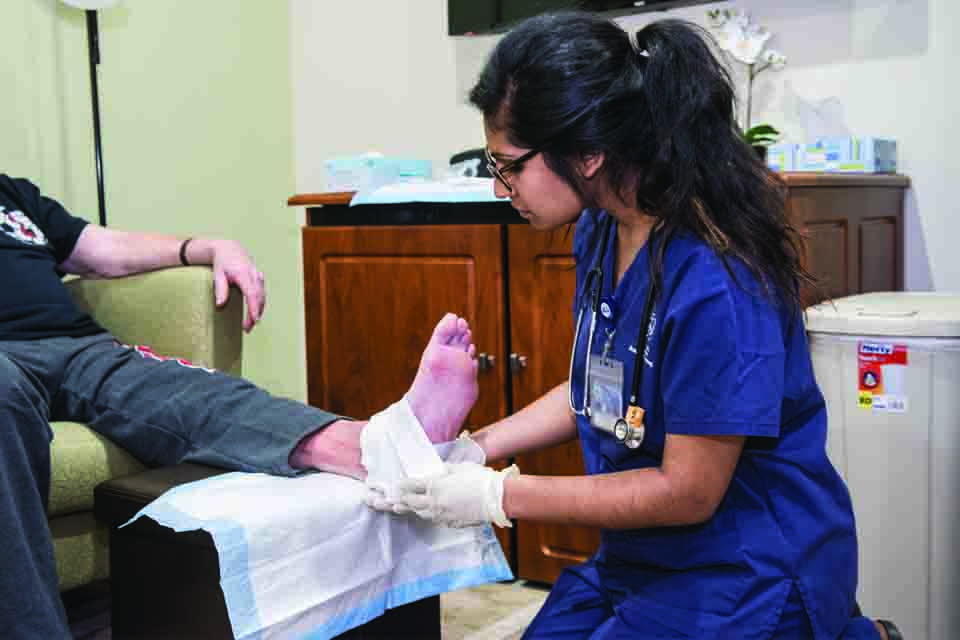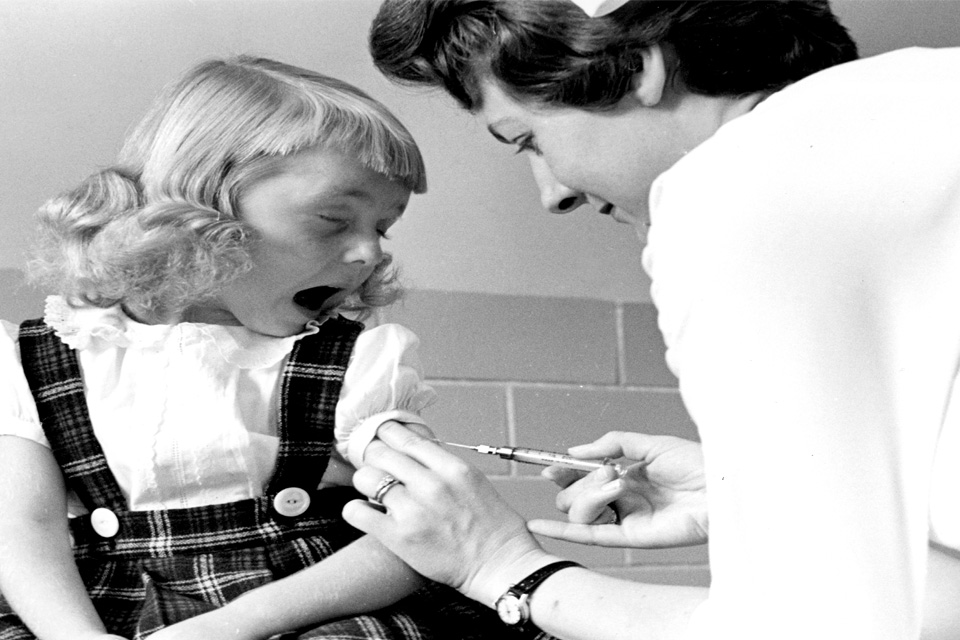Excellence and Autonomy
For 90 years, the mission of caring for the underserved has been woven throughout the School of Nursing’s fabric.
It has been present since the early days of students caring for the indigent at St. Mary’s Infirmary, to the present day of students providing free physicals to children in public schools. This core value of service is reinforced in academic courses, outreach initiatives and programs – perhaps none more so than the School of Nursing’s advanced nursing practice programs, primarily its nurse practitioner (N.P.) tracks.
Filling the Void
The idea was radical at the time. It was the late 1950s. Nurses were taking temperatures with mercury thermometers kept in cups of isopropyl alcohol, IVs came in glass bottles and injections were given with reusable glass syringes. Nurses only recently had been permitted to take blood pressure readings and use stethoscopes.
Yet, a decade later, Loretta Ford, R.N., and Henry Silver, M.D., at the University of Colorado, envisioned a greater role for nurses. They imagined a role in which nurses could assess, diagnose and even treat medical conditions. They established the first nurse practitioner training program in 1965 by educating pediatric N.P.s. The nurse practitioners were meant to fill the gap left by the large number of physicians who moved away from primary care and toward specialization.
Exacerbating the primary care shortage was approval in 1965 of the Medicare and Medicaid programs that provided health care coverage to women, children, elderly and disabled patients. The sudden availability of coverage increased demand for primary care services, especially in underserved urban and rural areas.
Survey Says
Cordie G. Reese, R.N., A.N.P., Ed.D., a professor with Saint Louis University School of Nursing, began exploring establishment of an N.P. program in the early 1990s. A survey she conducted in the metro area found robust interest in the post-master’s training. With support of a federal grant, she and fellow faculty members Janice Noack, R.N., Ph.D., associate dean, and Deborah Loman, Ph.D., A.P.R.N., associate professor, established N.P. programs with specialties in adult and gerontological care.
“Cost of health care had increased in the 1990s and research studies demonstrated nurse practitioners provided cost-effective, high quality care,” said Loman, pediatric primary care nurse practitioner faculty coordinator. “Faculty members were convinced of the merit of N.P.s, and this was the perfect time to start the program.”
The first class of 15 students graduated in 1995. Two years later, another survey coordinated by Reese found that 86 percent of nurses believed distance education would benefit students who otherwise would not have access to a university or could not pursue a higher degree because of work schedules or family responsibilities.
One third of the respondents asked to be contacted with information if a distance program were developed, which it was in 1997. The school received permission to start an online program with six, part time students in two states.
Today, the school’s N.P. program is entirely online with more than 400 students in 30 states. Students can choose to specialize as an adult gerontology acute care N.P., adult gerontology primary care N.P., family N.P., pediatric N.P. or family psych mental health N.P. The psych mental health program has been experiencing the most robust growth in the last few years, due in part to the school’s growing emphasis on integrative care, which stresses connections between physical and mental health.

“More than half of the adults with mental illness in this country don’t receive care,” said Thanavaro. “The health care system doesn’t have enough psychiatrists to treat the increasing number of patients who’ve gained access to behavioral health services through the Affordable Care Act.”
Thanavaro noted that the number of psychiatric physicians has dwindled, and psychiatrists are now the second most highly recruited physicians after family doctors. "Board certified family psychiatric advance practice nurses are ideally suited to meet this urgent need,” Thanavaro said. “The American Association of Nurse Practitioners (AANP) reports that only 21 percent of all advance practice nurses specialize in this field and the School of Nursing is committed to meet this extreme health care issue by growing our program.”
In 2008, advanced nursing practice education grew further when Thanavaro oversaw the development of a Doctor of Nursing Practice (D.N.P.) program –the first D.N.P. program offered in St. Louis. “Nurse practitioners with a doctoral degree have enhanced practice skills but also skills in evidence-based practice, systems and leadership,” said Thanavaro. “It gives our nurses a seat at the table when it comes to setting policy and getting practice solutions to the bedside more quickly.”
High Praise
While several other advanced nursing practice programs have developed in the St. Louis area, SLU’s programs remain among the most highly regarded. In 2017, U.S. News and World Report ranked the M.S.N.-N.P. program number 35 on its Best Online Master’s in Nursing survey. The D.N.P. program is ranked in the top 100 in the nation on the U.S. News Best Graduate Schools in Nursing. SLU board certification rates surpass the national average. The school’s intensive, on-campus orientation program for N.P. and D.N.P. students is one of the most comprehensive in the country. Four of the school’s faculty members are fellows in the American Association of Nurse Practitioners, the nation’s largest professional membership organization for N.P.s.
“We’ve achieved a level of educational excellence that distinguishes us and is unparalleled in the area,” said Loman. A recently implemented centralized application process is expected to increase enrollment in the school’s advanced practice programs, which will help meet the anticipated demand for highly skilled N.P.s. Merritt Hawkins & Associates, a leading health care placement service, reported that N.P.s are in the top five most requested searches, even though they were not in the top 20 five years ago.
The profession becomes even more attractive as nurse practitioners gain more autonomy. N.P.s have full scope of practice in 23 states and the District of Columbia and organizations such as the American Association of Nurse Practitioners are working to increase that number. Beyond the growth and accolades, the advanced practice nursing programs at SLU remain grounded in service, just as the school has been for the past 90 years. In 2017, faculty opened a nurse practitioner-operated clinic in north St. Louis city where faculty and students offer uninsured and underinsured patients free physical exams and treatment of acute illness. The nurses also offer TB tests, hepatitis A vaccinations, pregnancy and STD screenings, and screenings for diabetes, hypertension and lead.
Founded in 1928, Saint Louis University School of Nursing has achieved a national reputation for its innovative and pioneering programs. Offering bachelor's, master's, and doctoral nursing programs, its faculty members are nationally recognized for their teaching, research and clinical expertise.
